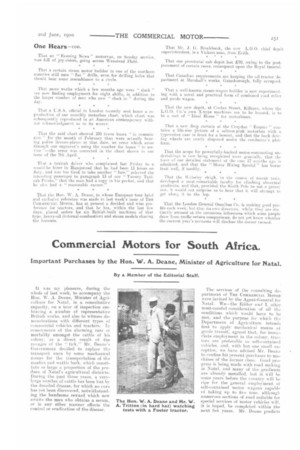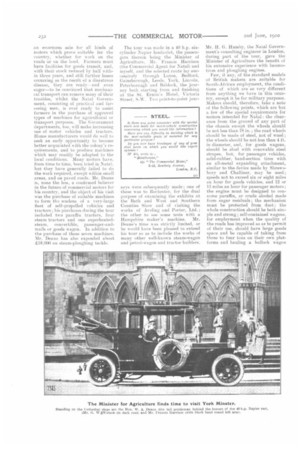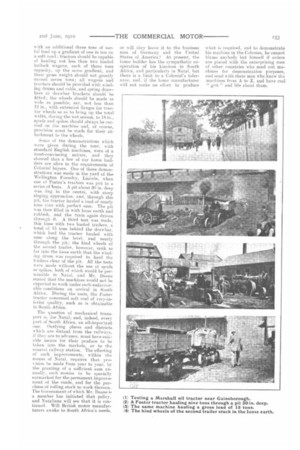Commercial Motors for South Africa.
Page 3

Page 4

Page 5

If you've noticed an error in this article please click here to report it so we can fix it.
Important Purchases by the Hon. W. A. Deane, Minister of Agriculture for Natal.
By a Member of the Editorial Staff.
It Was my pleasure, during the whole of last week, to accompany the Hon. W. A. Deane, Minister of Agriculture for Natal, in a consultative capacity, on a tour of inspection embracing a number of representative British works, and also to witness demonstrations with different types of commercial vehicles and tractors. In consequence of the alarming rate of mortality amongst the cattle of his colony, as a direct result of the rava=o% of the tick," Mr. Deane's Covernment decided to replace th.4 transport oxen by some mechanical means for the transportation of the mealics and wattle bark, which constitute so large a proportion of the produce of Natal's agricultural districts. During thepast three years, a verylarge windier of cattle has been lost by the dreaded disease, for which no cure has yet been discovered, notwithstanding the handsome reward which now awaits the man who obtains a serum, or in any other manner effects the control or eradication of the disease. The services of the consulting department of THE COMMERCI A L OTOR were invited by the Agent-General for Natal. We—the Editor am! I. after most-careful consideration of all the conditions which would have to be met, and the purpose for which the, Department of Agriculture intend.s first to apply mechanical means of goods Transit, agreed that, for immediate employment in the colony, tracturs are preferable to self-contained vehicles, and, with but one small exeeption, we have advised Mr. Deane to confine his present purchases to machines of the former class. Coal progress is being made with road making in Natal, and many of the gradients are already metalled, but it will be some Years before the country will be ripe for the general employment of self-contained motor wagons capable of taking Bp to five tons. although numerous sections of ro-ad suitable for special services of motor vehicles will, it is hoped, he completed within the next few years. Mr. Deane predicts
_an enormous sale for all kinds of niothrs which prove suitable for the country, whether for work on the roads or on the land. Farmers must have facilities for goods transit, and, with their stock reduced by half within three years, and still further losses occurring as the result of a disastrous disease, they are ready— and even eager—to be convinced that mechanical transport can remove many of their troubles, whilst the Natal Government, consisting of practical and farseeing men, is ever ready to assist farmers in the purchase of approved types of machines for agricultural or transport purposes. Thu Government departments, too, will make increasing use of motor vehicles and tractors. Home manufacturers would do well to seek an early opportunity to become better acquainted with the colony's requirements, and to produce machines which may readily be adapted to the local conditions. Many motors have, from time to time, been tried in atai. but they have generally failed to do the work required, except within small areas, and on paved roads. Mr. Deane is, none the less, a confirmed believer in the future of commercial motors for his country, and the object of his visit was the purchase of suitable machines to form the nucleus of a very-large fleet of self-propelled vehicles and tractors ; his purchases during the tour included two paraffin tractors, four steam tractors and one superheatedsteam, convertible, passenger-andmails or goods wagon. In addition to the purchase of these seven machines, Mr. Deane has also expended about M_8,000 an steam-ploughing tackle. The tour was made in a 40 h.p. sixcylinder Napier landaulet, the passengels therein being the Minister of Agriculture, Mr. Francis Harrison (the Commercial Agent for Natal) and myself, and the selected route lay successively through Loten, Bedford, Gainsborough, Leeds, York, Lincoln, Peterborough ond %Mock, the journey both starting from and finishing at the St. Ermin's Hotel, Victoria Street, S.W. Two point-to-point jour
neys were subsequently made; one of these was to Reehester, for the dual purpose of examining the exhibits at the 'Bath and West and Southern Counties Show and of visiting the works of Aveling and Porter, Ltd.; the other to see some tests with a Hampshire maker's machine. Mr. Deane's time st as strictly limited, or Lie would have been pleased to extend his tour so as to include, the works of many other well-known steam-wagon and petrol-wagon and tractor builders. Mr. H. G. Hunk, the Natal Government's consulting engineer in London, during part of the tour, gave the Minister of Agriculture the benefit of his extensive experience with locomotives and ploughing engines. Few, if any, of the standard models of British makers are suitable for South-African employment, the conditions of which are so very different from anything we have in this country, except it be for military purposes. Makers should, therefore, take a note of the following points, which are but a few of the special requirements for motors intended for Natal : the clearance from the ground of any part of the chassis except the wheels should be not less than 18 in.; the road wheels should he made of steel, not of wood ; the wheels should be not less than 4 ft. in diameter, and, for goods wagons, should be shod with renewable steel stropes, but, for passenger vehicles, solid-rubber, band-section tires with an all-metal expanding attachment, similar to the device made by Shrewsbury and Challiner, may be used ; speeds not to exceed six or eight miles an hour for goods vehicles, and 12 or 15 miles an hour for passenger motors; the engine must be designed to consume paraffin, or crude alcohol made from sugar residuals; the mechanism must be protected from dust ; the whole construction should be both simple and strong ; self-contained wagons, for employment when the quality of the roads has improved so as to permit of their use, should have large goods space and be capable of taking from three to four tons on their own platforms and hauling a bullock wagon
with an additional three tons of useful load up a gradient of one in ten on a soft road : tractors should be capable of hauling not less than two loaded bullock wagons, each of three tons capacity, up the same gradient, and their gross weight should not greatly exceed seven tons; all wagons and tractors should be provided with winding drums and cable, and spring drawbars or drawbar brackets should be fitted; the wheels should be made as wide as possible, say, not less than 12 in., with extension flanges for tractor wheels so as to bring up the total width, during the wet season, to 18 in., spuds and spikes should always be carried on the machine and, of course, provision must be made for their attachment to the wheels.
Sonic of the demonstrations which a ere given during the tour, with standard English machines, were of a most-convincing nature, and they showed that a few of our home builders are alive to the requirements of Colonial buyers. One of these demonstrations was made in the yard of the Wellington Foundry, Lincoln, when one of Foster's tractors was put to a series of tests. A pit about 30 in. deep was dug in the centre, with steep sloping approaches, and, through this pit, the tractor hauled a load of nearly nine tons with perfect ease. The pit was then filled in with loose earth and rubbish, and the train again driven through it. A third test was made, this time with two loaded trailers, a 4 total of 15 tons behind the drawbar, which load the tractor hauled with ease along the level, and nearly through the pit ; the hind wheels of the second trailer, however, sank so far into the loose earth that the winding drum was required to haul the trailers clear of the pit. All the tests were made without the use of spuds or spikes„ both of which would be permissible in Natal, and Mr. Deane stated that the machines would not be expected to work under such-unfavourable conditions on arrival in South Africa. During the tests, the Foster tractor consumed soft coal of very-inferior quality, such as is obtainable in South Africa.
The question of mechanical transport is, for Natal; and, indeed, every part of South Africa, an all-important one. Outlying places and districts which are distant from the railways, if they are to advance, must have suitable means for their produce to be taken into the markets, or to the nearest railway station. The effecting of such improvements, within the
means of Natal, requires that provision be Made from year to year, by the granting of a sufficient sum annually. such monies to be specially earmarked for the permanent improvement of the roads, and for the purchase of rolling stock to work thereon. The Government of which Mr. Deane is a member has initiated that policy, and Natalians will see that it is continued. Will British motor manufacturers awake to South Africa's needs,
or will they leave it to the business men of Germany and the United States of America ? At present, the home builder has the sympathetic co(peration of his kinsmen in South Africa, and particularly in Natal, hut there is a limit to a Colonial's tolerance, and. if the home manufacturer will not make an effort to produce
what is required, and to demonstrate his machine in the Colonies, he cannot blame anybody but himself if orders are placed with the enterprising men of other countries who send out machines for demonstration purposes, and send with them men who know the machines from A to Z, and have real " grit " and life about them.
























